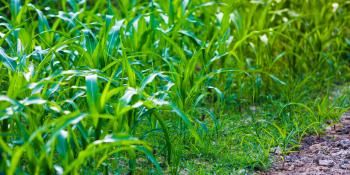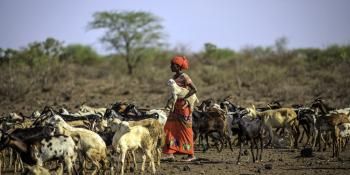Improving the adaptive capacity of women farmers in Western Kenya
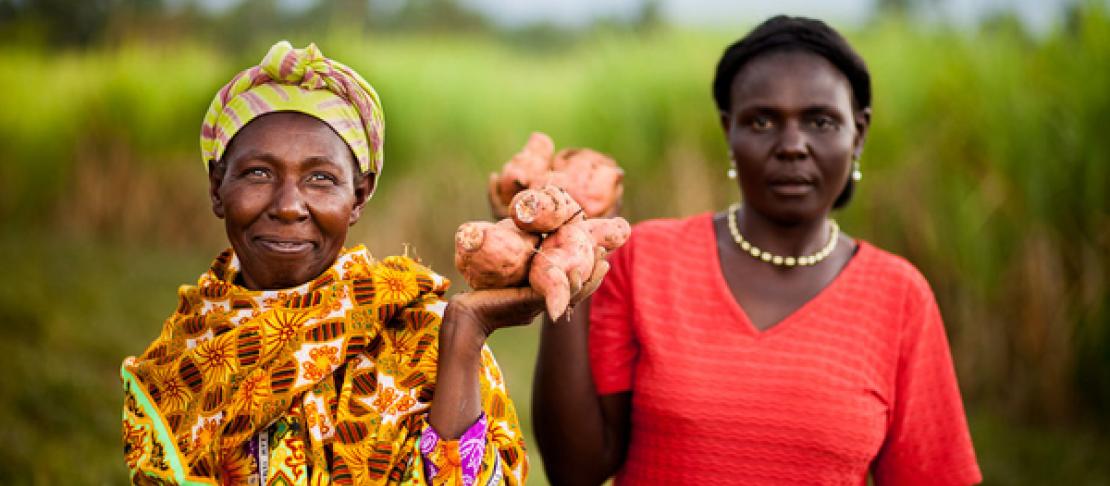
If women had access to resources, on farm yields could increase by 20-30%. Learn how Nyando women farmers are rising above this challenge
Empower a woman, empower nations, so goes the common saying.
As part of the 2014 participatory action research activities at the Nyando climate- smart villages, western Kenya, the CGIAR Research Program on Climate Change, Agriculture and Food Security (CCAFS), East Africa is undertaking training of women leaders, entrepreneurs and farmers in climate-smart innovations. In early August, 2014, 280 women attended the Kisumu Agricultural Society of Kenya (ASK) fair. The aim was to facilitate their learning on three thematic areas; new climate-smart practices and agro-advisories, appropriate on farm tools and technologies; and access to microfinance and micro- insurance.
The participants were carefully selected based on the type and status of crop and livestock enterprises on their farms. The trainers comprised extension officers from the Ministry of Agriculture, Livestock and Fisheries, and the Kenya Agricultural Research Institute (KARI).
Dialogue between women farmers and researchers
The women farmers exchanged ideas with a number of researchers during the fair. Farmer Elizabeth Korir had a chat with KARI scientist Paul Tana:
Elizabeth: So what is this disease that affected maize on my one acre farm. The maize leaves turned yellow and started drying. Is there a pesticide for that?
Paul: The disease is known as Maize Lethal Necrosis. It is viral and can't be eliminated once it strikes a crop.
Elizabeth: So how can I rescue my crop?
Paul: The only option is to cut the crop, put it in a heap in an isolated part of the farm and burn it or bury it deep in the soil to stop the disease from spreading.
Elizabeth: That is a waste; can’t I feed my cows with that, or will the disease spread to cows?
Paul: The diseased will not spread to cows, but exposing the infected crop will spread the disease to the rest of your farm. We also recommend that you try crop rotation and plant sorghum crop instead of maize.
Elizabeth: My family is used to maize. Perhaps I can change the variety to these new ones and then have some little sorghum crop. The taste of sorghum is strange to my family.
Paul: With the changing climate, you will need to be flexible to try new crops, and use improved agronomic practices. <ends>
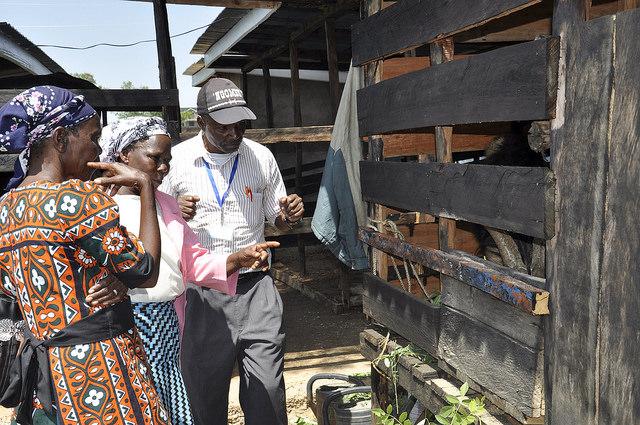
FARMERS LEARN MORE ABOUT LIVESTOCK BREEDS SHOWCASED AT THE KISUMU AGRICULTURAL FAIR. photo: t. muchaba (ccafs)
Climate information services
Farmers also learnt about accessing climate services from Maseno University and the Kenya Meteorological Services (KMS) scientists. In this session, specific Nyando climate products related to long term historical rain events were outlined. These highlighted the total rainfall in a season, number of rainy days, the start of rains, the length of growing season, and trends in temperature.
“I knew we are experiencing more frequent drought and flood events but had no idea about the reducing number of rainy days in the seasons. I need to talk to my husband about growing crops that need less water”, said farmer Emmy Rotich. she added.
As farmers continue to gain an understanding of historical climate products, the Maseno University-KMS team is exploring how it can provide monthly and bi-weekly seasonal forecasts to the farmers for on-farm decision making, as well as gather feedback from the community.
Read more: How can we help farmers better understand climate information
Success from previous farmer learning events
In 2013, 160 women attended the agricultural fair learning more on how best to combat weeds and pests, grow healthy vegetables and adapt crops to unpredictable weather and more.
Read more: Empowering women farmers to feed the world
One hundred and twenty (120) of the women who attended the 2013 fair have since started kitchen gardens and planted a variety of vegetables. The women also mobilized their small self-help groups to borrow money from their respective umbrella community based organization (CBO) Innovation Fund and started community demonstration farms on a total of 14 acres of land spread in seven villages.
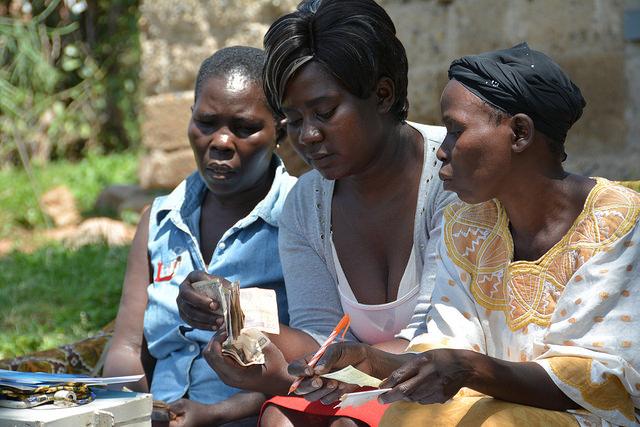
self-help groups in nyando csv are empowering communities by pooling resources and availing them to members. Photo: v. atakos (ccafs)
In the demonstration farms, they are showing new crops and improved varieties, as well as multiplying seed and cuttings. The crops include pigeon peas, green grams, cowpeas and sorghum developed by the International Crops Research Institute for the Semi-Arid Tropics (ICRISAT), and also beans developed by CIAT Pan African Bean Research Alliance.
Read more: Grandma Peris Owiti and her powerful climate-smart plants
In addition, the women are multiplying the nutritious orange fleshed sweet potatoes developed by the International Potato Center (CIP) and improved cassava variety that resists the mosaic virus which was developed by the International Institute of Tropical Agriculture (IITA). These demonstrations were key learning stations during a three day farmer field day attended by 3,000 farmers in June 2014.
Following the Kisumu fair trainings, it is anticipated that more women will practice improved crop production. This includes: cereal-legume intercropping; faster maturing varieties of maize, sorghum, finger millet; new methods of growing sweet potatoes; cassava for higher yield and crop rotation for maintaining soil fertility; composting; mulching ; water harvesting with leak proof liners for storing water and use of terraces and ridges to control soil erosion and reduce impact of flooding.
Watch video: crop rotation and diversification in Nyando
John Recha is a Participatory Action Research Specialist while Tabicha Muchaba is a Research Technician. They work with CCAFS East Africa. Edited by Vivian Atakos - Communication Specialist, CCAFS East Africa. For more information about CCAFS work in East Africa visit our webpage and follow @cgiarclimate_EA on twitter.

